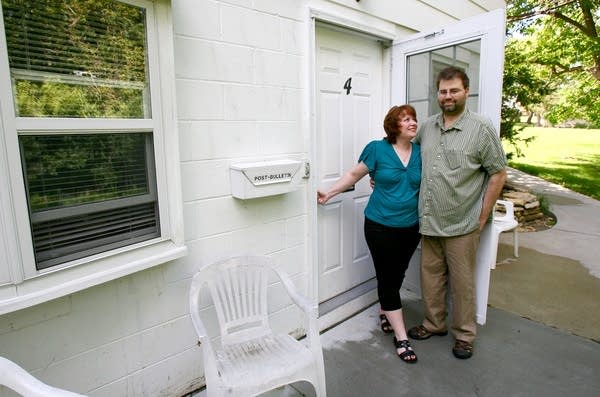Home away from home: When Mayo treatment makes you move to Rochester
Go Deeper.
Create an account or log in to save stories.
Like this?
Thanks for liking this story! We have added it to a list of your favorite stories.

For thousands of Mayo Clinic patients each year, a visit to the doctor means moving to southern Minnesota for a while.
Housing them is big business and can involve complicated demands from people at a stressful time in their lives.
Here's how one family put their lives on hold for a month and adapted to a temporary home in Rochester.
On the afternoon of Sunday, July 22, John and Tracy Fraedrich arrived at Cross Lake north of Brainerd for a week at the cabin with their family.
Turn Up Your Support
MPR News helps you turn down the noise and build shared understanding. Turn up your support for this public resource and keep trusted journalism accessible to all.
Ten minutes into their vacation, John's phone rang.
"I pick it up and it's Rochester," he recalled. "I said, 'Stop the car.' And I got it and it was the doctor saying, 'We have potential organs for you. Are you at all interested?'"
After 730 days on the transplant list, Fraedrich had a healthy kidney and pancreas waiting for him in Rochester. So the family packed up the fishing rods, dropped their son off with a relative in St. Cloud and made it to Rochester by 5 a.m. the next day.

While John underwent the six-hour transplant to save his life, Tracy hustled to find a place to live.
"I had done a lot of research and I was calling around," she said. "I didn't want to go somewhere, have to unpack and then have to repack. I just wanted to be done."
Each year, thousands of Mayo patients stay at the Clinic for more than two weeks at a time and many move to Rochester indefinitely for more complicated treatment.
The city is home to 52 hotels and 5,600 rooms and has more than a dozen short-term rentals and group and religious homes catering to patients like the Fraedrichs. That's more than half the number of hotel rooms as Minneapolis, which has 9,000 rooms and more than three times the population of Rochester. St. Paul has 8,500 rooms; Duluth has 4,300 rooms, according to STR Reports, which gathers hotel data for the Minnesota Lodging Association.
Rochester is expected to add another 1,500 hotel rooms in the next five years, according to the Rochester Convention and Visitors Bureau.
Every day, hundreds of people call the bureau for help, said Brad Jones, its executive director. Incoming patients and visitors want to know about lodging, grocery stores and transportation to and from the clinic.
"Most of the time, people are making these decisions a little bit in haste," Jones said. "They're nervous, they don't know what outcomes are going to be, sometimes they're grasping at straws, sometimes this is a last resort for them."
For the Fraedrichs, the right option was a one-bedroom, furnished apartment, all utilities included, for $2,600 a month.

It has a small living room and kitchenette, and the cabinets are stocked with plates, cups, silverware, even spices.
"Basically, I've got two house payments," Tracy said. "It's like I'm leading a dual life."
But the couple said they never questioned moving to Rochester, even though it's been emotionally and financially challenging.
"It's nice to, at the end of the day, after being poked and prodded, and everything, just to come here and relax, not have to share the TV with anybody else," John said. "There's not people asking about how your day was or anything like that."
Tracy took a leave of absence from her job as a social worker in Anoka County to move to Rochester. For several weeks, she drove back and forth between the homes and juggled the demands of her 8-year-old son, two houses and family pets.
Like many long-term Mayo patients, John says Rochester gave him the peace of mind knowing he was close to doctors in case something went wrong.
John was discharged from Mayo on Monday, after four weeks of calling Rochester home. The same night, he and Tracy returned to their home in the Twin Cities.
Now, John said, part of the next stage in his recovery will be coming to terms with the fact that he's no longer just blocks away from his doctors.




